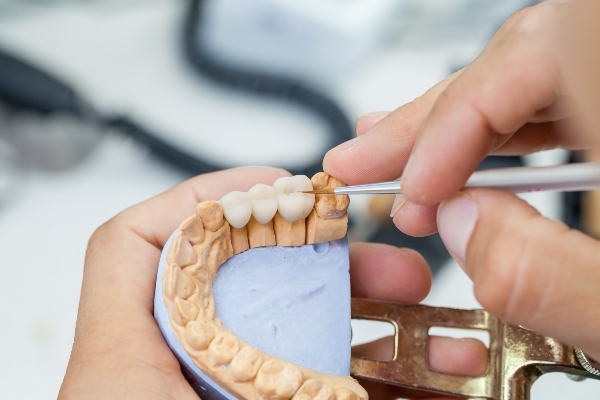Five Important Tips for Maintaining Dentures

Are you considering getting dentures? Read on to learn more about denture maintenance. Owning dentures comes with a fair share of responsibility, such as their care and maintenance. The following are some essential tips to help your appliance last as long as possible.
Five essential tips for maintaining dentures
Dentures may return a lot of normalcy to your life, but they can be expensive. Follow these tips to maintain your appliance and extend its longevity.
1. Remove and rinse dentures after eating
Like natural teeth, food particles can get stuck in dentures and create a layer of plaque on the artificial teeth. Over time, these food particles can erode the teeth, weaken the appliance, and cause stains. Rinsing is a quick and easy way to wash away food particles. Along with regular brushing, it is a vital step in maintaining dentures.
2. Continue to practice good oral hygiene
Patients must maintain good oral hygiene habits, even without natural teeth. Poor gum health can affect the fit of the dentures and require the patient to get adjustments. Patients should rinse and clean their mouth after removing their dentures, brush and floss their remaining natural teeth, then rinse with mouthwash.
3. Brush dentures regularly
Rinsing dentures after eating is a good habit, but it is not enough on its own. Patients should give their appliance a more thorough clean at least once daily. Cleaning dentures does not require fancy tools; a simple toothbrush and toothpaste will do. Avoid whitening toothpaste and hot water, as these can damage the appliance. Do not clean with abrasive cleaning materials that contain bleach or chlorine.
Denture owners should be careful while cleaning their appliances. Many patients damage their dentures while cleaning since the appliance is slippery when wet and easy to drop. Place a towel down before cleaning so the dentures will fall on a padded surface if dropped.
4. Soak dentures overnight
Some dentures need to be soaked overnight to help maintain their shape. Soaking keeps the dentures moist while also giving them a thorough clean. Plain water or a mild denture solution will do. Patients should check with their dentist and read the manufacturer’s care instructions since this may vary.
5. Check dentures for damage
Denture owners should make a regular habit of checking their appliances for damage. If a patient can spot the damage early, a dentist may be able to fix it before it gets worse.
Similarly, patients should report any change to the comfort or fit of the dentures to the dentist right away. Issues with dentures will not resolve on their own, and in fact, they will only worsen if ignored.
Frequently asked questions about dentures
Let us go over the answers to some of the questions our patients often have regarding dentures:
1. What do I do if I want to try dentures?
Getting dentures typically starts with a conversation with a dentist. An examination is performed to determine if dentures are the optimal solution for the patient. Some patients might be better off with other teeth replacement options like a dental bridge or implants. The dentist will make their recommendations based on factors like the patient’s preferences and how many teeth they have lost.
2. What are the various types of dentures available?
The two main categories of dentures are partial and full dentures. Partial dentures are recommended when a person is missing a few teeth positioned next to each other, while full denture sets are recommended when a patient has lost most of their teeth in each dental arch. There are also hybrid types of dentures like implant-supported dentures. These provide significantly more stability than traditional dentures.
3. Is it okay to sleep while wearing dentures?
Dentists typically do not recommend wearing dentures to bed, even though doing so does not damage the oral prosthetic. Dentures need to be washed daily and soaked in denture solution. Soaking dentures softens the appliance so it feels more comfortable when worn. Dentures should never be worn for more than 24 hours without cleaning them. Removing dentures before going to bed also gives your gums and jawbone a break from the pressure of having the appliance in your mouth all day.
Contact us for denture repair and adjustments
With proper maintenance, your dentures could last for many years. But even with the best care, changes to your gums or unavoidable wear and tear on your appliance will cause damage over time.
Do not procrastinate on regular maintenance and repairs. Minor damage to the dentures might be fixable, but more extensive damage could require a complete replacement. Reach out to us today and schedule your appointment if your dentures are due for repairs or relining.
Request an appointment here: https://drdavidbrumbaugh.com or call R. David Brumbaugh, DDS at (214) 306-4402 for an appointment in our Dallas office.
Check out what others are saying about our dental services on Yelp: Dentures in Dallas, TX.
Related Posts
Sometimes it is necessary for young people to get dentures to replace most or all of their teeth. While many people regard denture-wearing as something that occurs as people get older, tooth loss can happen at any age.If you are missing your natural teeth, dentures can give you back your smile. They do more than…
Many people see tooth replacement as something they can postpone without serious issues. However, putting off tooth replacement can lead to more problems than leaving a gap in your smile. Missing teeth can cause various oral and health problems, creating financial, functional, and emotional stress that you can otherwise avoid with immediate treatment.When a tooth…
When the smile is missing a tooth or three, a general dentist may recommend dental bridges to restore its appearance and functionality. Even a single missing tooth can cause difficulties with eating and speaking. It also leaves room for the remaining teeth to shift, leading to a misaligned bite. While traditional and implant-supported dental bridges…
General dentists are the primary dental professionals people visit once or twice per year for oral health care. According to the American Dental Association, or ADA, biannual appointments are necessary to protect the integrity of your oral health, regardless of age. During these appointments, the general dentist and their team perform check-ups and recommend preventative…


